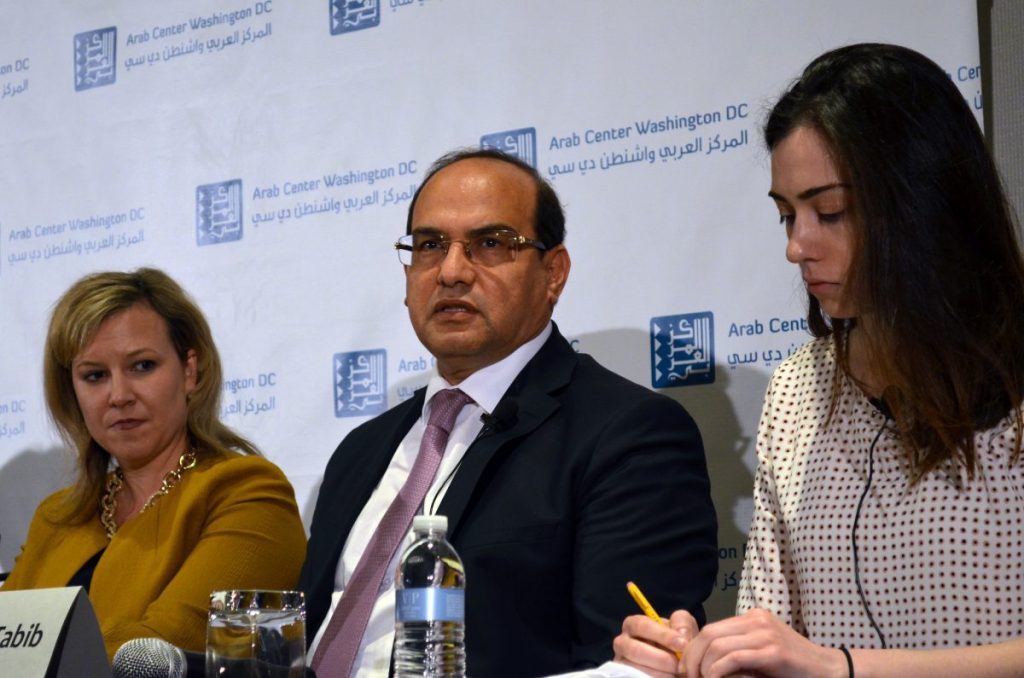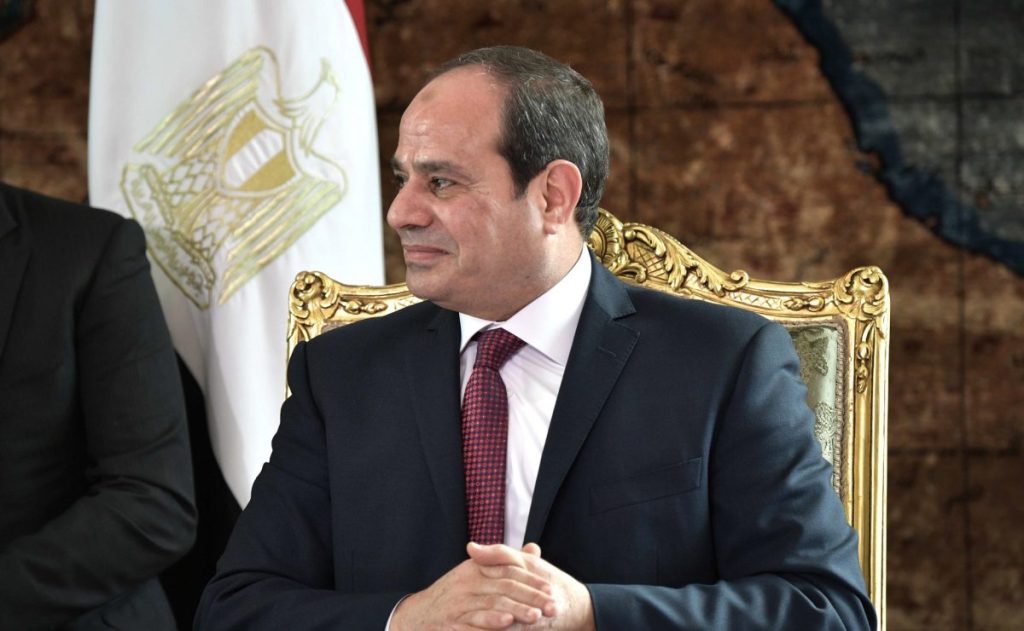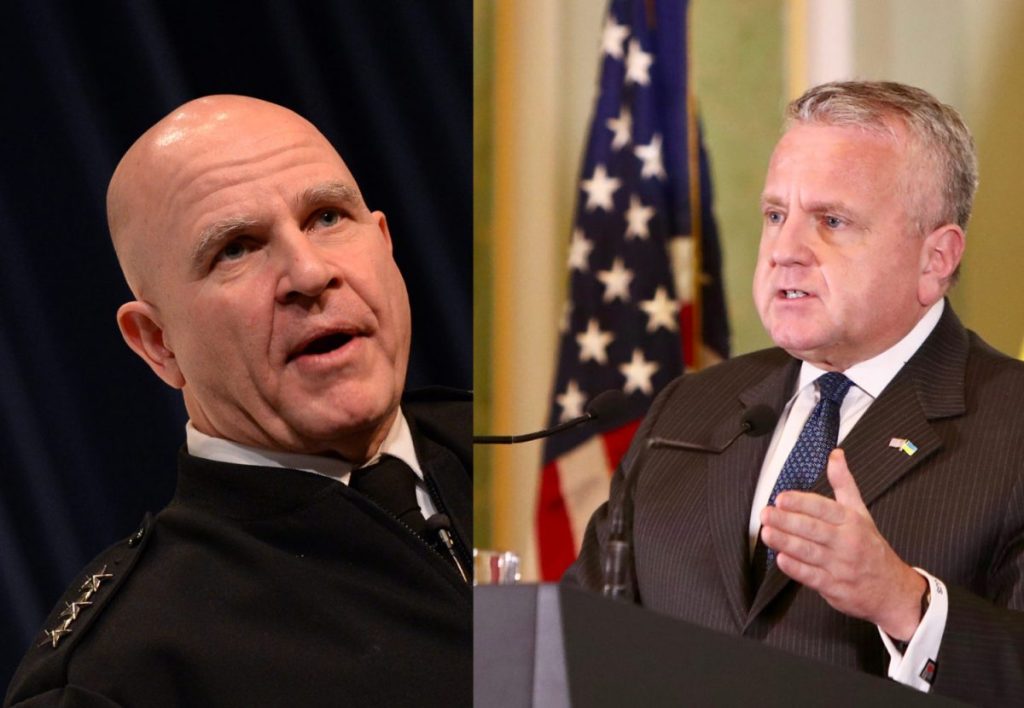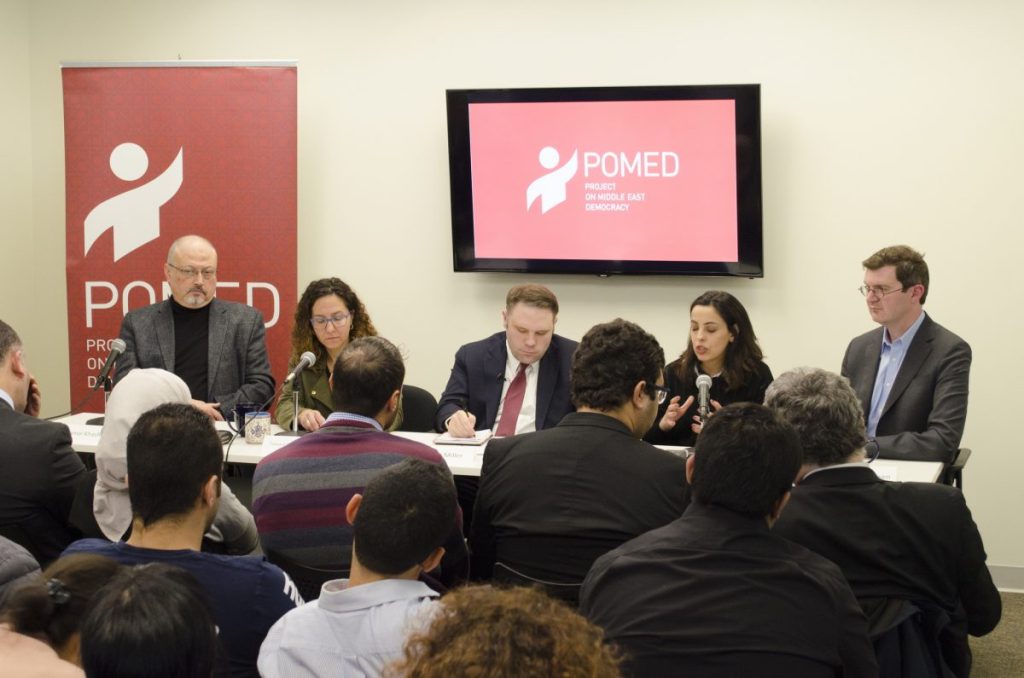Human Rights in Iran After the Nuclear Deal
This event was sponsored by the Project on Middle East Democracy (POMED).
With the Joint Comprehensive Plan of Action agreed upon, the international community has begun to focus on the implementation of the nuclear deal. During the course of negotiations, the human rights situation inside Iran failed to improve, and it remains unclear how such issues may be affected by the signing of the nuclear agreement. It also remains to be seen whether the nuclear agreement will now create any additional space for the international community to address its human rights concerns.
What changes can we expect to see in Iran’s domestic politics as sanctions are relieved and attention moves beyond nuclear negotiations? What role can the international community play in addressing human rights concerns in Iran? What changes might we expect in U.S. policy toward Iran post-nuclear deal, and how—if at all—can the United States play a constructive role in helping open space for domestic activists?
A discussion with:
Nazila Fathi
Author, The Lonely War: One Woman’s Account of the Struggle for Modern Iran
Former New York Times Correspondent, Tehran
Dokhi Fassihian
Senior Program Manager, Freedom House
Suzanne Maloney
Deputy Director, Foreign Policy Program, Brookings Institution
Senior Fellow, Center for Middle East Policy, Brookings Institution
Moderated by:
Stephen McInerney
Executive Director, Project on Middle East Democracy (POMED)
On October 14, POMED hosted a public panel discussion titled “Human Rights in Iran After the Nuclear Deal.” Panelists included Nazila Fathi, author of The Lonely War: One Woman’s Account of the Struggle for Modern Iran; Dokhi Fassihian, Senior Program Manager for the Middle East and North Africa at Freedom House; and Suzanne Maloney, Deputy Director of the Foreign Policy Program at the Brookings Institution and Senior Fellow in the Brookings Center for Middle East Policy. Moderating was Stephen McInerney, Executive Director of POMED.
In her opening remarks, Nazila Fathi stated that her prior expectation that the human rights situation in Iran would deteriorate has come to pass. She distinguished that it is not the government writ large leading the crackdowns, but instead the judiciary. However, President Hassan Rouhani is incapable of stopping these crackdowns on the whole. While he was able to curtail the “modesty police” last year when they were targeting primarily women (and even some men) who were deemed to be immodestly dressed, he is unable to put an end to the targeted arrests and detentions. Meanwhile, the judiciary has continued its systematic repression of various sections of society, including those of the Baha’i faith and unions. The hardliners are clearly feeling vulnerable, evident in all of their harsh repressive moves. Fathi believes that the most pressing situation, however, is that of women. It was primarily lower class women who supported the Revolution and were therefore able to climb up the socioeconomic ladder due to regime support. These “Islamist feminists” have been rewarded with quotas for women in employment and university acceptance. If the regime tries to backtrack, the number of women employed and in school will decrease, thus reversing the gains in female empowerment.
Following Ms. Fathi, Dokhi Fassihian shared in her opening remarks that there was a hope that if the nuclear negotiations were resolved and diplomatic discussion occurred, there would be an “opening.” Through economic re-engagement and cultural exchanges, Iran would come out of the extreme isolation it has put itself in and repression would therefore be more difficult. Fassihian gives three main reasons why the human rights situation has instead deteriorated since President Rouhani came into office. First, during the nuclear negotiations and engagement with the international community, the government has actually taken the opportunity to crack down. As the government consolidated a crackdown, there was no reaction from the international community due to the emphasis on nuclear negotiations, essentially giving the regime a green light. Second, Supreme Leader Ali Khamenei has been working to weaken opponents ahead of the 2016 parliamentary elections. It is in his interest not to see an opening on human rights, and repression of those who would bring human rights into the discussion is therefore in his interests. Finally, the international community as a whole has weakened its stance on human rights in Iran over the past few years, again emphasizing nuclear negotiations over the issue of human rights abuses.
In addition, Fassihian argues that another obstacle to democracy and human rights promotion in Iran is the “narrative Iranians are force fed from a young age,” which emphasizes that Iran is always a victim of bigger powers and the United States in particular. Therefore, there is a belief among Iranians that trusting the international community will lead to the weakening and breakdown of the country, so Iran remains isolated for fear of state collapse. While Iranians are ready to “counter that narrative”, they are not necessarily empowered to do so, and the international community is not clear on how to do so. While Iranians have tried to improve their situation themselves through voting and peaceful protest, the structure of the government makes it extremely hard for citizens to have any actual influence. The powers of Supreme Leader Khamenei and the Guardian Council are simply too strong and with these powers they are “micromanaging” domestic policy.
To conclude, Fassihian gave a few recommendations for what the international community can do to help improve the human rights situation in Iran. While various resolutions related to human rights in Iran have been passed at the United Nations since the 1980s, with monitoring missions occurring in the 1980s, the monitoring discontinued in the 1990s with the election of former president Mohammad Khatami, whose platform promised reforms that never came to pass. In 2011, the U.S., along with Brazil, Sweden, and the European Union worked to establish a stronger monitoring mechanism, which reported the deterioration of human rights in the country. However, nothing was done because, again, the international community was more focused on nuclear negotiations, which sent the signal that human rights were of secondary importance. Therefore, Fassihian proposed three steps the international community must take. First, the consensus from 2011 needs to be rebuilt, with a coalition strengthened by and organized around a “real human rights agenda that charts a path for progress.” Second, the international community needs to sanction human rights violators, particularly those high level members of the judiciary and Guardian Council who are directly responsible for human rights violations. Finally, a Commission of Inquiry needs to be launched, following the models of the successful Commissions on North Korea and Eritrea.
Finally, in Suzanne Maloney’s opening remarks she expounded upon U.S. policy towards Iran, highlighting that regardless of the will of members of the policy community to improve the human rights situation in Iran, they have relatively few tools with which to do so. With the beginning of nuclear discussions over a decade ago, Washington realized it had almost no leverage with Iran, so the administrations of former President George W. Bush and President Barack Obama worked for years to build this leverage. While former President Mahmoud Ahmadinejad did work to unite the international community in their views on Iran, there is still no multilateral consensus on human rights being on the agenda in discussions about Iran, as Russia and China are unwilling to entertain discussions related to human rights. Therefore, Maloney suggests that the U.S. must work to rebuild and sustain a common position with its European allies. While the U.S. and Europe once had opposing views on Iran, the decade of nuclear negotiations has brought them to the same side. Finally, the U.S. needs to do more to talk about political prisoners, because it is international attention that ultimately changes their status. For example, the international community has ignored that opposition candidates from the last election who have now been under house arrest for four and a half years, and bringing international attention to these matters is what can possibly work to change such predicaments.
Next, Stephen McInerney asked the panelists what could be expected in the upcoming 2016 elections. Ms. Fathi said she expects some surprises, and that what she believes is more important than the elections themselves is whom the Guardian Council announces as eligible to run. In the past, anyone who posed any sort of threat to the regime was barred from running, and because of this, the current parliament is ineffective at bringing about change; the only people who are in power are those who are willing to comply with government orders. However, she was surprised by the last presidential elections. She expected that the votes would not even be counted and Rouhani’s victory was a shock. She believes he won because the government elites sensed that a prospect for change was required. Therefore, she believes that in the upcoming election there is a possibility for more independent candidates due to this sense among elites that a small space needs to be opened for liberalization. She also notes that as people move up socioeconomically, their political affiliation tends to change; people who started out in the lower classes and supported the regime have moved up to the middle classes and no longer support it. Also noteworthy is that the younger generations’ views do not always align with that of their parents. For example, Ali Jannati, Minister of Culture, is considered to have more moderate views than his father, Ahmad Jannati, Chairman of the Guardian Council, considered to be a hardliner.
By contrast, Fassihian argued that she expects no surprises in the upcoming elections. While the sophistication of the factions and coalition building in the last election improved, elections continue not to be free and fair, and the Supreme Leader has made it clear that the Guardian Council will look extremely closely at the candidates. Maloney meanwhile emphasized that repression is likely to decrease in the run-up to the elections. Historically with international press attention comes less repression, followed by serious crackdowns once the international attention wanes.
Subsequently, audience members were given the opportunity to ask the panelists questions. First among these was whether there were openings for international assistance to Iranian civil society groups, whether this assistance was wanted, and also what overall role international attention can play. First, the panelists noted the importance of “naming and shaming,” which works to publicly shame those who are directly involved in human rights crackdowns and makes more people in Iran reluctant to join groups enforcing harsh repressive policies. Second, international attention does generally work to improve the conditions for civil society activists in prison. It has been found that when international attention is brought to their case, their prison conditions improve. For example, they are moved from solitary confinement to a larger cell with other people, whereas those prisoners whose cases are not public knowledge always end up staying in prison longer. Finally, while there is a desire for international attention and aid for the civil society organizations, this is a double-edged sword. Receiving international help automatically sets them as being allied with the Western “enemy.” Not providing assistance, however, feeds into the Iranian victimhood narrative.
Next, a question was posed about how the U.S.’s ability to bring international attention to human rights abuses in Iran is hindered by its inconsistent record on human rights worldwide. The consensus among all panelists was that this does hurt U.S. efforts. The U.S. has bundled the myriad concerns it has about Iran, including the nuclear issue, regional designs supporting terrorism, and human rights, into one blanket issue. However, these must all be tackled separately. Historically, it looks as though the U.S. drops human rights concerns in favor of other issues and politicizes human rights as a whole. Furthermore, there is the problem of feeding into Iran’s victimhood narrative. By calling attention to Iran’s human rights abuses and not Saudi Arabia’s, for example, Iran can manipulate this to be a narrative of the West playing favorites and marginalizing Iran.
Another question was if there was any way positive inducements could be more effective than pressuring the government into human rights improvements. The panelists believed that the Iranian government was afraid of its own people, as evidenced by the harsh repressive moves. For the Supreme Leader and those who support him, they view the end of Iran’s isolation as the end of the regime, so they are afraid of any opening that could change the isolation. Also, animosity towards the U.S. is one of the remaining principles from the Islamic Revolution, therefore leaving no opportunity for positive inducements.
A final question posed was why dissent from Ali Motahari has been tolerated by the regime. Generally, the panelists believe he has been tolerated because he can be used as the “token politician” the government can look to in order to be able to say that dissent is tolerated. He also happens to come from a prominent family tied to the Revolution and is generally unpopular due to his very conservative social notions. He lacks a real support base and is unpopular among the youth and women, as he wants to go back to radical societal restrictions on women.



